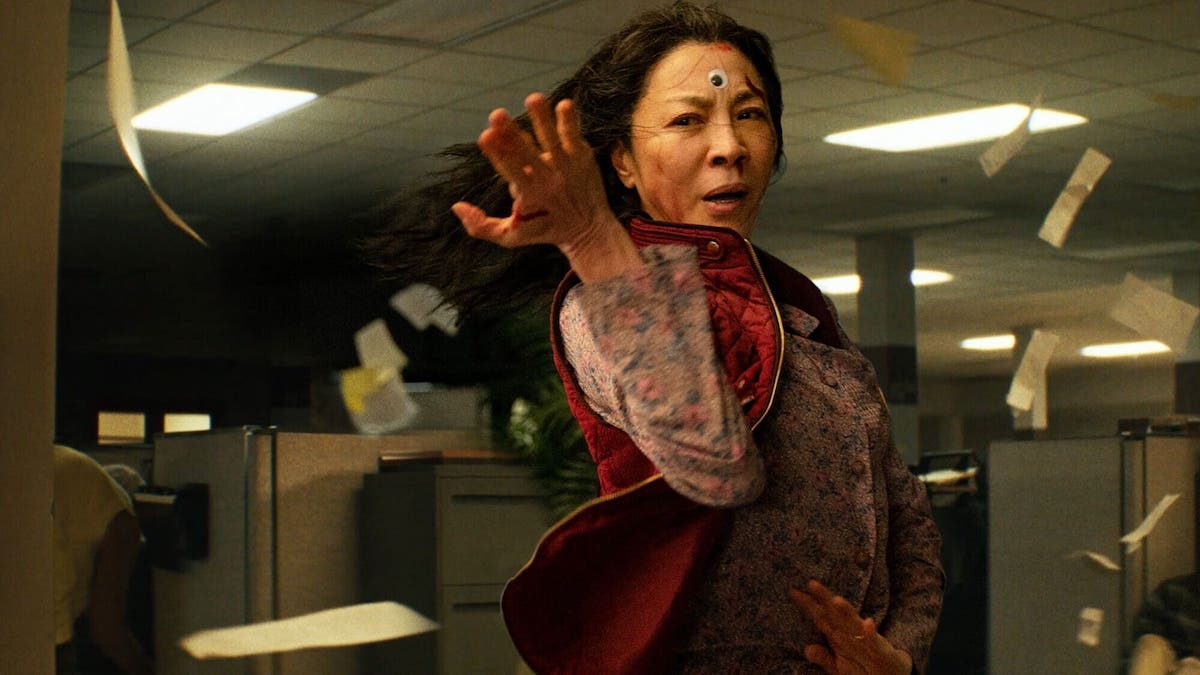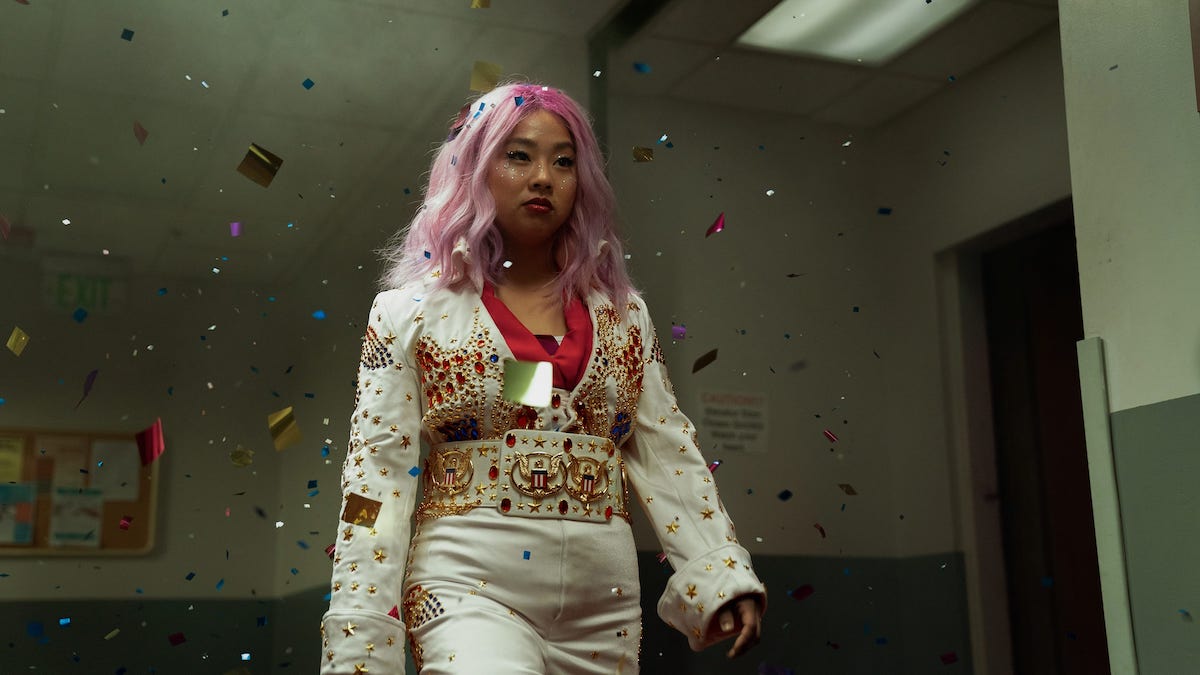EVERYTHING EVERYWHERE ALL AT ONCE (2022)
An ageing Chinese immigrant is swept up in an insane adventure, where she alone can save the world by exploring other universes connecting with the lives she could have led.

An ageing Chinese immigrant is swept up in an insane adventure, where she alone can save the world by exploring other universes connecting with the lives she could have led.


Having left an indelible impression with the absurdist black comedy Swiss Army Man (2016), where Daniel Radcliffe played a flatulent corpse being used as an all-purpose tool by Paul Dano trapped on a desert island, it’s taken far too long for filmmaking duo Dan Kwan and Daniel Scheinert (“the Daniels”) to make another movie. That it’s one of the year’s biggest sleeper hits, becoming an unprecedented success at the US box office, is both a testament to the filmmakers tapping into the Asian-American demographic and for appealing to anyone desperate for a unique vision behind the camera.
Everything Everywhere All at Once (hereafter Everywhere) concerns a Chinese-American woman called Evelyn Wang (Michelle Yeoh), who runs a struggling laundromat with her meek husband Waymond (Ke Huy Quan) that’s about to be audited by the IRS. Adding to an already chaotic and anxious time, Evelyn’s father Gong Gong (James Hong) has arrived in the country from China and her lesbian daughter Joy (Stephanie Hsu) is having difficulty coming out to her grandfather. The scene’s set for a drama about a dysfunctional family struggling to communicate across the generations, whose lives as immigrants don’t make things any easier, but Everywhere takes things in an almost unimaginably bizarre direction. At the IRS office, Waymond is temporarily ‘possessed’ by another consciousness, who informs Evelyn that he’s from a parallel universe (one of many across an infinite ‘multiverse’) and that she’s the only chance his ‘Alphaverse’ have to stop a threat to all reality known as Jobu Tupaki.

The concept of a multiverse seems to have caught the imagination of filmmakers in recent years, but while Marvel Studios utilises the theory more as an excuse to bring in superhero characters from neighbouring franchises (see: Spider-Man: No Way Home), Everything takes a far more elaborate and interesting approach. Here, the multiverse has direct consequences for Evelyn and helps her to grow as a wife, mother, and human being. There’s not really any ‘verse-jumping’ (as the Alpha Waymond describes it) for Evelyn, as she’s instead only able to access the memories and skills of her counterparts in other lives she could have led—from a sign-spinning pizzeria worker, world-class singer, glamorous movie star, teppanyaki chef, kung fu master, and even a woman with fingers shaped like hot dogs.
Everything certainly won’t be to everyone’s taste. While audiences are accustomed to the notion of a multiverse, the Daniels’ approach is one that’s both distinctive and unconcerned about events making total sense. There are no boring portals to walk through into other worlds here, as people instead have to help a machine lock onto a relevant counterpart with useful abilities by doing random and bizarre acts (like giving yourself paper cuts, eating chapstick, or switching footwear) in order to nudge your life’s trajectory a little closer to the one you’re targeting. This proves to be the movie’s main source of comedy, as it opens the story up to some adult-rated Rick & Morty-style shenanigans that will amuse and disgust in equal measure.

Originally a project intended for Jackie Chan (with Yeoh as his wife), things thankfully went in a different direction once Yeoh became the lead. Now a recognisable face around the world, from her days as a Hong Kong action star in Yes, Madam (1985) and Police Story 3: Supercop (1992), through to her Hollywood breakthrough with Tomorrow Never Dies (1997) and Crouching Tiger, Hidden Dragon (2000), Yeoh has been handed the role of a lifetime as Evelyn. The part is primarily one of a stressed woman who never made the best choices in her life, and whose marriage is going stale as she becomes increasingly estranged from her own daughter. It’s the sort of character that could land you an Academy Award, but Yeoh also has to let that dramatic performance merge with the concerns of a wacky sci-fi adventure that has Evelyn accessing a variety of personality and skills (so Yeoh naturally gets to indulge her stuntwoman background once again).
Similarly good is Ke Huy Quan as Waymond, who’s best-known for his child star days in the 1980s playing Short Round in Indiana Jones and the Temple of Doom (1984) and Data in The Goonies (1985). Like many young actors, Quan’s career didn’t blossom once he grew up, so by the late-1990s he’d transitioned into film production and stunt choreography (working on the likes of X-Men and The One—which is also about the multiverse). The success of Crazy Rich Asians (2018), which coincidentally starred Yeoh, made Quan excited to get back into acting and Everywhere is his first major role in decades. That he’s so good makes me a little frustrated we’ve missed out on seeing him more often over the past 30 years. Quan arguably has a tougher job than Yeoh as Waymond, too, as his character more frequently switches between two personalities and the differences are more apparent to audiences as we’re less familiar with him as a celebrity.

The supporting cast is also strong and it’s always a treat to see the legendary James Hong (Big Trouble in Little China) in a sizeable role, Stephanie Hsu (The Marvelous Mrs. Maisel) makes a strong impression as angst-ridden millennial Joy, and it’s a surprise to see Jamie Lee Curtis (Halloween Kills) embracing such a frumpy character as joyless IRS auditor Deirdre Beaubeirdra.
While there are undoubtedly aspects of the film I won’t ever connect with the same way as immigrants, especially those of Chinese origin, Everything still works despite having a lot of subtext for the experiences foreigners have when arriving in a country like the US and trying to make a life for themselves, while always feeling somewhat torn between two very different worlds and cultures.
It’s not a perfect film, at least for me. I found the lack of clear explanations about how the multiverse concept worked a little tough in the first half of the film, as we’re just as confused as Evelyn and there’s never a moment when everything about the lore clicked into place. But perhaps that’s because I can’t help looking for rationality and logic in a film that’s intentionally absurd and farcical at times, so I doubt any theoretical scientists will be using this as a touchstone for helping people understand how a multiverse might work. I’d describe the film as a multiverse version of The Matrix (1999) made with the spirit of Michel Gondry, and with a delightful twist that “The One” is a woman whose great strength is being the worst of her kind… but therefore with the most untapped potential.
If you want to experience a sci-fi film that doesn’t hand-hold and goes to places you can’t predict, Everything Everywhere All at Once is certainly a good and increasingly rare example. It could have perhaps been improved with a half-hour cut away in the middle, as it’s over two hours and the story doesn’t quite justify such an epic length (not helped by the fact a lot of it takes place inside the IRS building), but there’s such a clear and unique approach to the story, concepts, action sequences, and comedy that it’s a great feeling to sit down to watch a mainstream movie that isn’t playing by any rules or following a formula.
USA | 2022 | 139 MINUTES | 1.85:1 | COLOUR | ENGLISH • MANDARIN • CANTONESE


writers & directors: Dan Kwan & Daniel Scheinert.
starring: Michelle Yeoh, Stephanie Hsu, Ke Huy Quan, Jenny Slate, Harry Schum Jr., James Hong & Jamie Lee Curtis.
